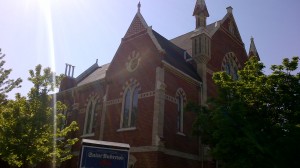 Last week I got to visit St. Andrew’s church, located in the heart of Barrie at Owen and Worsley. I was glad to visit the day they were celebrating “Healing and Reconciliation Sunday.”
Last week I got to visit St. Andrew’s church, located in the heart of Barrie at Owen and Worsley. I was glad to visit the day they were celebrating “Healing and Reconciliation Sunday.”
Reconciliation is a concept that is very close to my heart. It’s hard to work your way around the churches of Barrie without realizing that there are some deep divisions on the family of God. Some of these are recent rifts, and some are centuries old conflicts that successive waves of immigrants have brought with them from the Old World. Very often I’ll encounter groups who define themselves not so much by who they are, but by who they are not.
So it’s fitting to have a day set aside to think about reconciliation. This is, after all, at the heart of the gospel we claim to follow: reconciliation between God and humanity, but also between fractured groups and individuals. In 2 Corinthians 5, Paul reminds us that God has both reconciled us to himself, but also given us a ministry of reconciliation. In 1 Corinthians 13, he highlights the primacy of love – something that has greater importance than any knowledge, gift or ability. These and other verses framed the discussion of reconciliation presented at St. Andrew’s last week.
This was not purely a theoretical discussion. The speaker admitted that the Presbyterian Church had suffered deep divisions in its recent past. In 1925 the denomination split apart, with 60% joining the newly formed United church. Congregations, missions, colleges and residential schools had to decide on which side of the divide they would belong. The speaker also took the opportunity to delve fearlessly into the church’s recent history with the residential school system. This is obviously a large topic, and one which as a newcomer to Canada I’m still learning about. It was good to hear the church recognize that in choosing to become an instrument of government policy in ‘civilizing’ aboriginal people, she had lost sight of her calling to love, understand and cherish the communities in which she worked. It was also encouraging to hear about the work of the Truth and Reconciliation commission, and the various attempts that are being made to bring healing to past hurts.
I didn’t have much time to meet folks afterwards, but I did find it a friendly and welcoming congregation. Lots of people greeted me on the way in and out.
All in all a good morning. Reconciliation is not an easy topic. It involves digging up past hurts and taking a long, painful look at our own behaviors and prejudices etc. But despite that I’m convinced that it lies at the heart of the gospel, and I’m very glad to see a congregation deal honestly with the challenge of reconciliation.